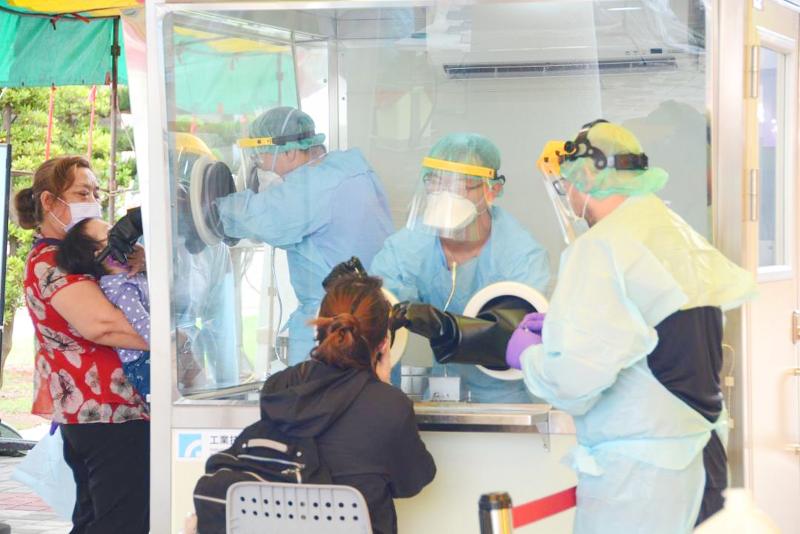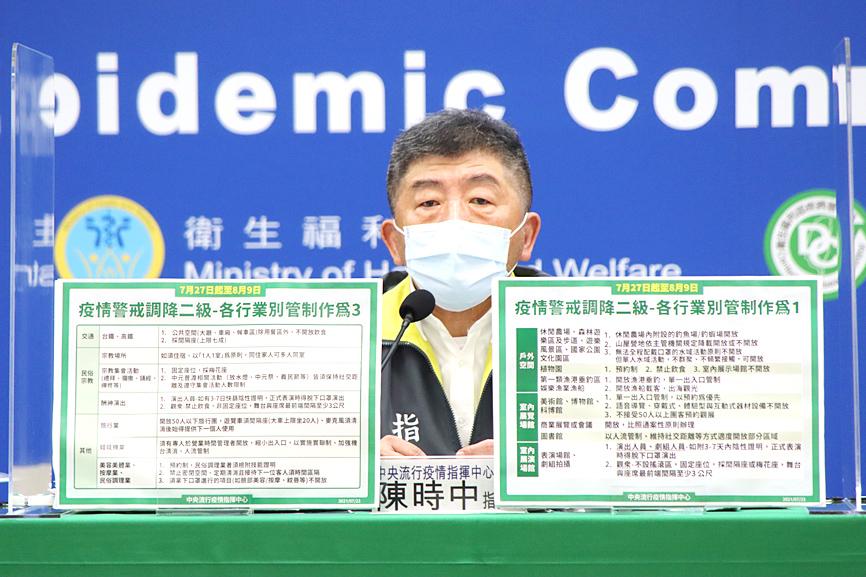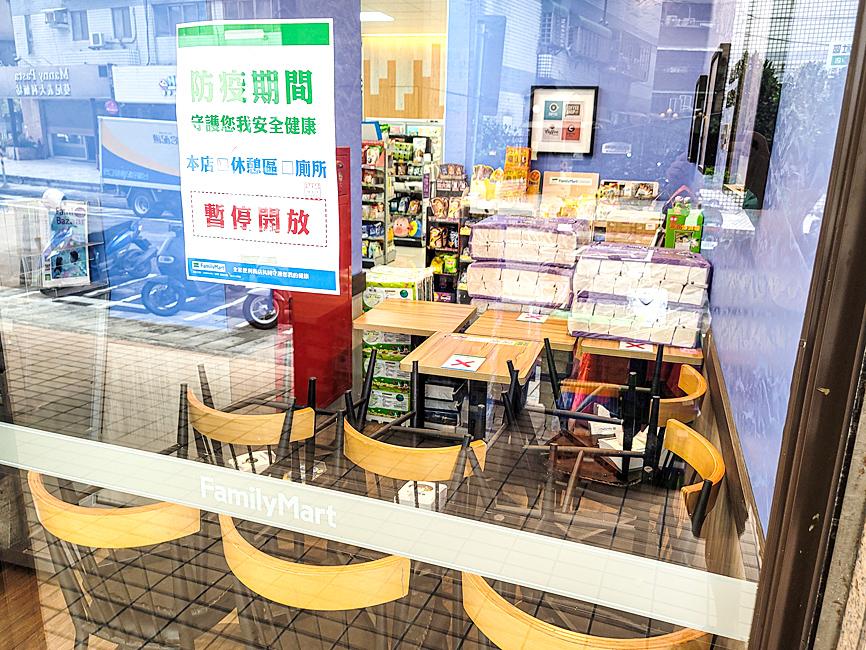A nationwide COVID-19 alert is to be lowered from level 3 to 2 on Tuesday, but strict border controls would remain, the government said yesterday.
The level 3 alert in place since May 19 is to end on Monday, with a level 2 alert in place from Tuesday until Aug. 9, the Executive Yuan said.
Minister of Health and Welfare Chen Shih-chung (陳時中), who heads the Central Epidemic Command Center (CECC), told a news conference in Taipei that over the next two weeks, people should still wear masks at all times outdoors, except while eating or drinking, and practice social distancing.

Photo: Liu Yu-ching, Taipei Times
The maximum number of people allowed for indoor gatherings would increase from four to 50, while the maximum for outdoor gatherings would increase from nine to 100, Chen said, adding that tour groups could contain up to 50 people.
Funerals and wedding banquets can be held with the same crowd limits, but newlyweds at banquets should not make tableside toasts, he said.
Businesses and public spaces must still record visitors’ contact information, while enforcing social distancing of 1.5m indoors and 1m outdoors, he said.

Photo courtesy of the Central Epidemic Command Center
Places that can reopen if they have proper disease prevention measures in place include kindergartens, cram schools, bowling alleys, infant care centers, dementia care facilities, certain fishing ports and religious sites, he said.
Art and science museums must have visitors register before arriving and cannot allow groups of more than 49 people, Chen said.
Artists and crew at performance halls can remove their masks while performing, as long as they submit a negative virus test result obtained three to seven days before the performance, Chen said.

Photo: CNA
Audience members must be seated at least 3m from the stage, while individual spectators should be properly separated, he added.
A ban on visits to patients at hospitals remains in effect, but the CECC would today announce whether it would allow visits to patients or residents at long-term care facilities, he said.
Places that remain closed under the level 2 alert include community colleges, swimming pools and leisure businesses, such as dance halls, nightclubs, KTVs, gaming halls and mahjong parlors, he said.
Asked if companies should still ask employees to work from home, Chen said it is not mandatory, but expressed the hope that the practice would be maintained.
While the CECC on Monday last week allowed restaurants to offer dine-in services, most local governments did not follow suit.
Asked about dine-in restrictions, Chen said that the CECC’s guidelines are only for reference.
The Taipei and New Taipei City governments yesterday said they would maintain a ban on dine-in services, only allowing restaurants to provide takeout services.
Chen said that the CECC would still maintain strict border controls.
Although it might adjust measures for foreign visitors who have received two doses of a COVID-19 vaccine, such a plan has not yet been finalized, he said.
The new measures are subject to change, Chen said, adding that people should still remain vigilant amid the pandemic.

A magnitude 5.6 earthquake struck off the coast of Yilan County at 12:37pm today, with clear shaking felt across much of northern Taiwan. There were no immediate reports of damage. The epicenter of the quake was 16.9km east-southeast of Yilan County Hall offshore at a depth of 66.8km, Central Weather Administration (CWA) data showed. The maximum intensity registered at a 4 in Yilan County’s Nanao Township (南澳) on Taiwan’s seven-tier scale. Other parts of Yilan, as well as certain areas of Hualien County, Taipei, New Taipei City, Taoyuan, Hsinchu County, Taichung and Miaoli County, recorded intensities of 3. Residents of Yilan County and Taipei received

Taiwan has secured another breakthrough in fruit exports, with jujubes, dragon fruit and lychees approved for shipment to the EU, the Ministry of Agriculture said yesterday. The Animal and Plant Health Inspection Agency on Thursday received formal notification of the approval from the EU, the ministry said, adding that the decision was expected to expand Taiwanese fruit producers’ access to high-end European markets. Taiwan exported 126 tonnes of lychees last year, valued at US$1.48 million, with Japan accounting for 102 tonnes. Other export destinations included New Zealand, Hong Kong, the US and Australia, ministry data showed. Jujube exports totaled 103 tonnes, valued at

BIG SPENDERS: Foreign investors bought the most Taiwan equities since 2005, signaling confidence that an AI boom would continue to benefit chipmakers Taiwan Semiconductor Manufacturing Co’s (TSMC, 台積電) market capitalization swelled to US$2 trillion for the first time following a 4.25 percent rally in its American depositary receipts (ADR) overnight, putting the world’s biggest contract chipmaker sixth on the list of the world’s biggest companies by market capitalization, just behind Amazon.com Inc. The site CompaniesMarketcap.com ranked TSMC ahead of Saudi Aramco and Meta Platforms Inc. The Taiwanese company’s ADRs on Tuesday surged to US$385.75 on the New York Stock Exchange, as strong demand for artificial intelligence (AI) applications led to chip supply constraints and boost revenue growth to record-breaking levels. Each TSMC ADR represents

TRUST: The KMT said it respected the US’ timing and considerations, and hoped it would continue to honor its commitments to helping Taiwan bolster its defenses and deterrence US President Donald Trump is delaying a multibillion-dollar arms sale to Taiwan to ensure his visit to Beijing is successful, a New York Times report said. The weapons sales package has stalled in the US Department of State, the report said, citing US officials it did not identify. The White House has told agencies not to push forward ahead of Trump’s meeting with Chinese President Xi Jinping (習近平), it said. The two last month held a phone call to discuss trade and geopolitical flashpoints ahead of the summit. Xi raised the Taiwan issue and urged the US to handle arms sales to